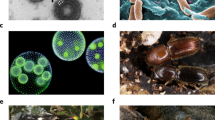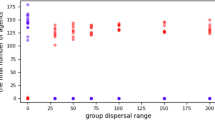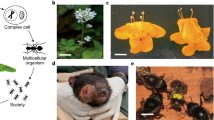Abstract
Cooperation is central to many major transitions in evolution, including the emergence of eukaryotic cells, multicellularity and eusociality1. Cooperation can be destroyed by the spread of cheater mutants that do not cooperate but gain the benefits of cooperation from others1,2. However, cooperation can be preserved if cheaters are facultative, cheating others but cooperating among themselves2. Several cheater mutants have been studied before, but no study has attempted a genome-scale investigation of the genetic opportunities for cheating. Here we describe such a screen in a social amoeba and show that cheating is multifaceted by revealing cheater mutations in well over 100 genes of diverse types. Many of these mutants cheat facultatively, producing more than their fair share of spores in chimaeras, but cooperating normally when clonal. These findings indicate that phenotypically stable cooperative systems may nevertheless harbour genetic conflicts. The opportunities for evolutionary moves and countermoves in such conflicts may select for the involvement of multiple pathways and numerous genes.
This is a preview of subscription content, access via your institution
Access options
Subscribe to this journal
Receive 51 print issues and online access
$199.00 per year
only $3.90 per issue
Buy this article
- Purchase on Springer Link
- Instant access to full article PDF
Prices may be subject to local taxes which are calculated during checkout



Similar content being viewed by others
References
Maynard Smith, J. & Szathmary, E. The Major Transition in Evolution (Freeman, Oxford, 1995)
Travisano, M. & Velicer, G. J. Strategies of microbial cheater control. Trends Microbiol. 12, 72–78 (2004)
Greig, D. & Travisano, M. The Prisoner’s Dilemma and polymorphism in yeast SUC genes. Proc R. Soc. B 271 (Suppl. 3). S25–S26 (2004)
Griffin, A. S., West, S. A. & Buckling, A. Cooperation and competition in pathogenic bacteria. Nature 430, 1024–1027 (2004)
Ennis, H. L., Dao, D. N., Pukatzki, S. U. & Kessin, R. H. Dictyostelium amoebae lacking an F-box protein form spores rather than stalk in chimeras with wild type. Proc. Natl Acad. Sci. USA 97, 3292–3297 (2000)
Foster, K. R., Shaulsky, G., Strassmann, J. E., Queller, D. C. & Thompson, C. R. L. Pleiotropy as a mechanism to stabilize cooperation. Nature 431, 693–696 (2004)
Gilbert, O. M., Foster, K. R., Mehdiabadi, N. J., Strassmann, J. E. & Queller, D. C. High relatedness maintains multicellular cooperation in a social amoeba by controlling cheater mutants. Proc. Natl Acad. Sci. USA 104, 8913–8917 (2007)
Queller, D. C., Ponte, E., Bozzaro, S. & Strassmann, J. E. Single-gene Greenbeard effects in the social amoeba Dictyostelium discoideum. Science 299, 105–106 (2003)
Strassmann, J. E., Zhu, Y. & Queller, D. C. Altruism and social cheating in the social amoeba Dictyostelium discoideum. Nature 408, 965–967 (2000)
Velicer, G. J., Kroos, L. & Lenski, R. E. Loss of social behaviors by Myxococcus xanthus during evolution in an unstructured habitat. Proc. Natl Acad. Sci. USA 95, 12376–12380 (1998)
Velicer, G. J., Kroos, L. & Lenski, R. E. Developmental cheating in the social bacterium Myxococcus xanthus. Nature 404, 598–601 (2000)
Velicer, G. J. et al. Comprehensive mutation identification in an evolved bacterial cooperator and its cheating ancestor. Proc. Natl Acad. Sci. USA 103, 8107–8112 (2006)
Kessin, R. H. Dictyostelium—Evolution, Cell Biology, and the Development of Multicellularity (Cambridge Univ. Press, Cambridge, 2001)
Buss, L. W. Somatic cell parasitism and the evolution of somatic tissue compatibility. Proc. Natl Acad. Sci. USA 79, 5337–5341 (1982)
Filosa, M. F. Heterocytosis in cellular slime molds. Am. Nat. 96, 79–91 (1962)
Fiegna, F. & Velicer, G. J. Exploitative and hierarchical antagonism in a cooperative bacterium. PLoS Biol. 3, e370 (2005)
Chen, G., Shaulsky, G. & Kuspa, A. Tissue-specific G1-phase cell-cycle arrest prior to terminal differentiation in Dictyostelium. Development 131, 2619–2630 (2004)
Shaulsky, G. & Loomis, W. F. Mitochondrial DNA replication but no nuclear DNA replication during development of Dictyostelium. Proc. Natl Acad. Sci. USA 92, 5660–5663 (1995)
Sternfeld, J. & David, C. N. Fate and regulation of anterior-like cells in Dictyostelium slugs. Dev. Biol. 93, 111–118 (1982)
Jermyn, K. A., Duffy, K. T. & Williams, J. G. A new anatomy of the prestalk zone in Dictyostelium. Nature 340, 144–146 (1989)
Nielsen, R. Molecular signatures of natural selection. Annu. Rev. Genet. 39, 197–218 (2005)
Knecht, D. A., Cohen, S. M., Loomis, W. F. & Lodish, H. F. Developmental regulation of Dictyostelium discoideum actin gene fusions carried on low-copy and high-copy transformation vectors. Mol. Cell. Biol. 6, 3973–3983 (1986)
Thompson, C. R., Fu, Q., Buhay, C., Kay, R. R. & Shaulsky, G. A bZIP/bRLZ transcription factor required for DIF signaling in Dictyostelium. Development 131, 513–523 (2004)
Sussman, M. Cultivation and synchronous morphogenesis of Dictyostelium under controlled experimental conditions. Methods Cell Biol. 28, 9–29 (1987)
Kuspa, A. & Loomis, W. F. Tagging developmental genes in Dictyostelium by restriction enzyme-mediated integration of plasmid DNA. Proc. Natl Acad. Sci. USA 89, 8803–8807 (1992)
Shaulsky, G., Escalante, R. & Loomis, W. F. Developmental signal transduction pathways uncovered by genetic suppressors. Proc. Natl Acad. Sci. USA 93, 15260–15265 (1996)
Eichinger, L. et al. The genome of the social amoeba Dictyostelium discoideum. Nature 435, 43–57 (2005)
Kibler, K. et al. A novel developmental mechanism in Dictyostelium revealed in a screen for communication mutants. Dev. Biol. 259, 193–208 (2003)
Acknowledgements
We thank past and present members of our groups, especially A. Khare, E. Roberge, K. Foster and N. Mehdiabadi, for discussions and for technical assistance; R. H. Kessin for the fbxA- strain and for discussions; and W. F. Loomis for encouragement and advice. This work was supported by a grant from the National Science Foundation; L.A.S. was supported by a Wray–Todd Fellowship. C.R.L.T. was supported by the Wellcome Trust International Prize Traveling Research Fellowship.
Author Contributions L.A.S., C.R.L.T., E.V., J.S. and C.D. conducted the experimental work. A.P. and R.S. performed computational analyses. A.K., C.R.L.T., D.C.Q., G.S. and J.E.S. conceived of the study and wrote the paper. All authors discussed the results and commented on the manuscript.
Author information
Authors and Affiliations
Corresponding author
Supplementary information
Supplementary Information
The file contains Supplementary Notes; Supplementary Figures 1-5 with Legends; and Supplementary Tables 1-3. (PDF 1005 kb)
Rights and permissions
About this article
Cite this article
Santorelli, L., Thompson, C., Villegas, E. et al. Facultative cheater mutants reveal the genetic complexity of cooperation in social amoebae. Nature 451, 1107–1110 (2008). https://doi.org/10.1038/nature06558
Received:
Accepted:
Published:
Issue Date:
DOI: https://doi.org/10.1038/nature06558
This article is cited by
-
CRISPR/Cas9-based genome-wide screening of Dictyostelium
Scientific Reports (2022)
-
Mutant resources for functional genomics in Dictyostelium discoideum using REMI-seq technology
BMC Biology (2021)
-
Conditional expression explains molecular evolution of social genes in a microbe
Nature Communications (2019)
-
Clonality and non-linearity drive facultative-cooperation allele diversity
The ISME Journal (2019)
-
A single mutation in rapP induces cheating to prevent cheating in Bacillus subtilis by minimizing public good production
Communications Biology (2018)
Comments
By submitting a comment you agree to abide by our Terms and Community Guidelines. If you find something abusive or that does not comply with our terms or guidelines please flag it as inappropriate.



